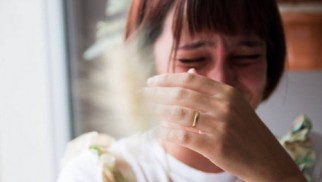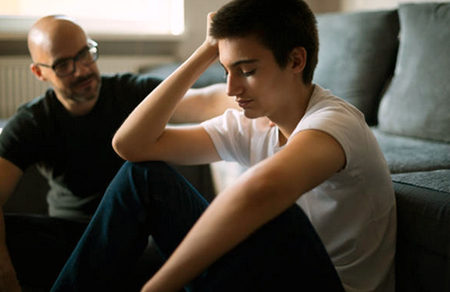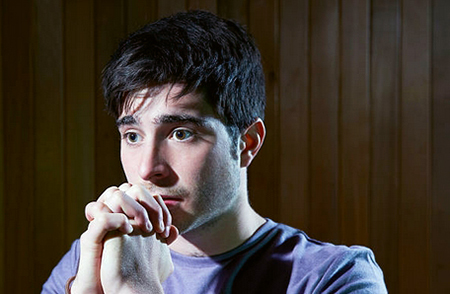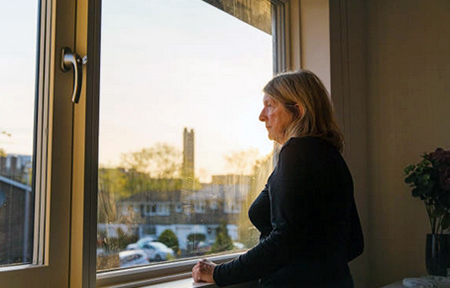Reactive depression – what is it and what are the risk factors?


Reactive depression is a mental disorder that occurs as a response to an extremely traumatic situation experienced by a person or prolonged exposure to a combination of several less significant stress factors. This type of depression has the maximum number of factors that can provoke its occurrence. Affecting the human psyche at different degrees, the traumatic events that it is unable to endure become catalysts that trigger a destructive process of negative personality change.
Short information about reactive depression
Prolonged reactive depression, in addition to its own extremely unpleasant symptoms, is dangerous because it can result in neuroses, anxiety and asthenic-depressive syndrome, pathologies of perception, and manic psychosis. Depression of this kind must not be ignored - it will not go away on its own, therefore, professional treatment is needed to restore health.
Causes and forms of reactive depression
The reasons for the development of this type of depression are negative powerful changes in a person's life, which provoke strong or prolonged stress and, as a result, the appearance of symptoms of the disease. This can be: severe or prolonged illness, or the loss of a loved one. The reasons can also be: parting with a husband or wife, a loved one, large financial losses, troubles at work, relationship problems, imprisonment, bad habits, the death of a beloved pet.
In addition, the appearance and development of reactive depression is influenced by:

- Genetic predisposition;
- Features of education (upbringing);
- Disturbances in the chemical balance of the brain;
- Features of the constitution/temper;
- Chronic diseases;
- Organic brain damage.
The intensity of depression is determined using a special scale that includes the very traumatic events perceived by the absolute majority of mentally healthy people as serious tragedies.
This form of depression can develop in 2 ways: in the form of an acute reaction lasting up to 1 month and prolonged, lasting from 1 month to 2 years. Short-term reactive depression usually develops very quickly and immediately after exposure to the mental sphere of a person by stress factors.
Prolonged reactive depression is expressed in unreasonable tearfulness, pessimistic attitude towards the present and future, extremely depressed mood, a sharp decrease in energy, ideas of self-accusation, hypochondriacal thoughts. The behavior of patients is characteristic: they are weak-willed, apathetic, focused on internal experiences, lose interest in performing duties and in entertainment.
Subtypes of reactive depression
- True depressive disorder. This form of reactive depression is characteristic of those who are constantly in a sad, dull and indifferent state (apathy), do not eat and hardly get enough sleep. They are also characterized by other symptoms: despair and unwillingness to somehow change the unpleasant situation, delusional thoughts and ideas that lead to self-torture and thoughts of suicide.

- Mixed anxiety-depressive disorder. The main feeling that patients experience with this form of reactive depression is fear, turning into panic, which only aggravates the symptoms of depression, complicates a positive outlook, and, as it develops further, is accompanied by bouts of aggressiveness and anxiety. Patients constantly live in strong emotional stress under the influence of stress hormones that negatively affect immunity and an unstable psyche.
Risk factors
Reactive depression develops much more rapidly in those who are included in the following risk groups:
- Unmarried people who live alone and feel a lack of communication;
- Managers or decision-makers who are chronically emotionally exhausted;
- People who are used to keeping all feelings to themselves;
- People with addictions.
In the presence of these conditions predisposing to the development of reactive depression, the likelihood of its occurrence increases significantly.
Reactive depression symptoms
Reactive depression begins with the classic state of shock, which is combined with individual characteristics that vary depending on the constitutional qualities of a person: excitability, emotional instability, critically low mood, depression, a tendency to look at the world with skepticism and cynicism. Patients perceive their surroundings in black colors, do not rejoice and do not have fun, but fall into severe despondency and all-embracing melancholy. They become extremely irritable, respond angrily to the efforts of loved ones to talk to them, cry almost constantly and for no reason.
In reactive depression, the general emotional state of patients can be defined as consistently low. They are so depressed that it even affects their appearance:

- They have drooping shoulders;
- Hunched back;
- Bowed head;
- Drooping gaze.
Patients with this depression react to external stimuli in completely different ways: either they freeze in a stupor, not reacting to the events happening around them and the words addressed to them, or, on the contrary, they demonstrate their feelings too emotionally, cry loudly, desperately gesticulate, and generally act dramatically.
For those who suffer from reactive depression, mental activity is aimed at excessive and aimless analysis of tragic events that have happened to them, which they cannot forget and let go. Often they also blame themselves for what happened, finding some kind of secret pleasure in it.
Turning their thoughts to a traumatic event, they try to restore it in memory in the smallest detail, tire themselves and those around them with assumptions about what could be done to prevent a negative event. At the same time, they want to receive sincere understanding, empathy for their problem and genuine sympathy.
The emotionality of the patients is so increased that every mention of the tragedy causes them a new surge of despair and pain, expressed in excessive tearfulness. Many of them are even afraid to fall asleep, since the traumatic event does not let them go in their sleep. Sometimes, when this type of depression intensifies, delusional ideas of persecution are added to the inexplicable anxiety experienced by the patients.
Reactive depression can be expressed by excitement, turning into a panic attack, tachycardia and heart pains, rapid breathing, muscle weakness, decreased blood pressure, disorientation, severe dizziness, excessive sweating.
The main symptoms of reactive depression are:

- Feeling of utter hopelessness and deep despair;
- Feeling of meaningless of the future;
- Violation of the normal regime and duration of sleep;
- Change of previous food preferences.
Reactive depression is complicated by the fact that when it reaches its maximum, the patient begins to develop various phobias, thoughts of suicide appear, and sometimes auditory hallucinations. These symptoms indicate a deep damage to the psyche and require immediate treatment.
Reactive depression treatment
Reactive depression in an untreated form responds well to psychotherapeutic methods, even without the use of medications. The goal of psychotherapy is to teach a person to overcome their own fears and conflicts, normalize the psycho-emotional background and return an optimistic attitude to life. But, if the depression has taken an acute form, the patient has panic attacks or suicidal thoughts, drug treatment will be needed.
A good effect on this depression is given by the following drugs:

- Antidepressants (drugs from the SSRI group, for instance, Paroxetine), which perfectly stabilize and raise mood, reduce the level of anxiety, remove the feeling of panic and fear. The minimum course of therapy with these drugs is 3 weeks.
- Tricyclic antidepressants (Imipramine) that help both with desperation and anxiety.
- Tranquilizers of the benzodiazepine series, which have excellent hypnotic, muscle relaxant, and sedative effects;
- Antipsychotics, which eliminate too strong psychomotor agitation and anxiety;
- Hypnotics that relieve mental stress and normalize sleep.
An excellent effect in the treatment of reactive depression is provided by a combination of drugs and a course of cognitive as well as rational psychotherapy in combination with hypnosis sessions.
Reactive depression is a very serious mental disorder; therefore, if left untreated, it will develop further, which will only increase its negative impact. But you cannot engage in self-medication either, any depression should be treated by a doctor with the necessary knowledge and experience.
How to prevent reactive depression?
To prevent reactive depression from spoiling life and coming back again, you need to work on its prevention:

- Sleep at least 8 hours a day so that the brain can rest and the body replenishes energy reserves in the cells;
- Communicate more with family and friends, not hiding your problems from them;
- Eat properly;
- Alternate work and rest, do not overwork;
- Change your job to an easier one;
- Incorporate regular physical exercises in your daily routine;
- Eliminate bad habits.
All these measures, if not neglected, will reduce the likelihood of developing reactive depression and depression in general, help maintain mental health and eliminate the need to think about how to treat such diseases.
Post is made based on the information provided by: Elizabeth Agrer, clinical pshychiatrist, Copenhagen, Denmark
(Updated at Apr 14 / 2024)
Tofranil articles:
Some of the trademarks used in this Web Site appear for identification purposes only.
All orders are reviewed by a licensed physician and pharmacist before being dispensed and shipped.
The statements contained herein are not intended to diagnose, treat, cure or prevent disease. The statements are for informational purposes only and is it not meant to replace the services or recommendations of a physician or qualified health care practitioner. If you have questions about the drugs you are taking, check with your doctor, nurse, or pharmacist.